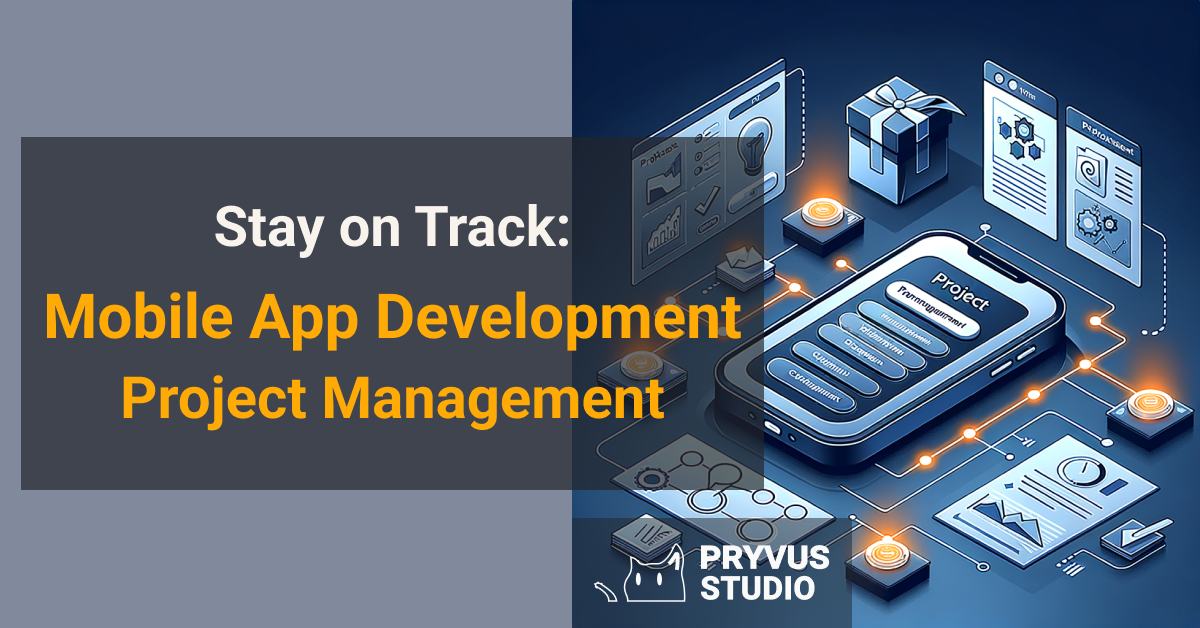Notice: Only variables should be passed by reference in /home/ploi/pryvus.com/public/wp-content/themes/pryvus/template-parts/content-post.php on line 12

Understanding mobile app development project management is crucial for success.
Turning a vision into a successful app demands expertise, collaboration, and the right tools. It’s about making complex processes manageable and ensuring that the end product aligns perfectly with the client’s needs.
In this article, you will learn:
- How to choose the right project management methodology.
- The importance of collaboration in app development.
- Strategies for navigating common development challenges.
Understanding Mobile App Development Project Management
Let’s dive right in. Mobile app development project management is no small feat. It’s about guiding a concept through to a finished app. This process involves many steps. Each one needs careful attention. Why? Because in the tech world, details make or break success.
Effective mobile app development project management is the backbone of any successful app.
At Pryvus Studio, we’ve seen it all. We know the ins and outs of managing these projects. From initial brainstorming to final testing, every stage is crucial. But don’t worry. I’ll walk you through what this entails. Together, we’ll uncover the intricacies of this process.
First off, project management in mobile app development is about more than just timelines and tasks. It involves understanding the client’s vision. Then, transforming that vision into a tangible product. This means constant communication. It’s about being agile and adaptable. Changes will happen. The key is managing them without derailing the project.
Choosing the right project management methodology is vital. Agile? Waterfall? Hybrid? Each has its benefits. The choice depends on the project’s nature. More on this in the next section. But remember, the methodology shapes the project’s flow. It impacts how teams collaborate and how solutions evolve.
Collaboration is another cornerstone. It’s not just about the dev team. Clients, designers, and testers all play a part. At Pryvus Studio, we embrace a client-centric approach. This means involving clients at every step. Why? Because it ensures the final product truly meets their needs.
Of course, challenges will arise. Technical issues, scope creep, communication gaps they’re part of the journey. The trick is to anticipate and address them early. This minimizes their impact. Plus, leveraging technology can streamline the process. Tools for task management, communication, and testing can be game-changers.
In conclusion, managing a mobile app development project is complex. But with the right approach, it’s entirely manageable. It’s about marrying methodology with flexibility. It’s about clear communication and collaboration. And it’s about leveraging technology to keep everything on track.
Choosing the Right Project Management Methodology
When embarking on a mobile app development project, selecting the right project management methodology is pivotal. It’s the blueprint that guides the entire development process, ensuring that the project stays on track and meets its objectives. With various methodologies available, each with its unique strengths, the choice largely depends on the project’s specific needs, team dynamics, and client requirements.
The success of a mobile app development project hinges on the choice of the right project management methodology.

Agile stands out as a preferred methodology for many development teams. Its iterative approach allows for flexibility, making it easier to adapt to changes and incorporate feedback. Key features include sprint planning, daily stand-ups, and retrospectives, fostering a collaborative environment and continuous improvement.
Another methodology worth considering is the Waterfall model. This traditional approach is linear and sequential, making it suitable for projects with well-defined requirements and no expected changes. Each phase must be completed before moving on to the next, providing a clear structure and timeline.
Choosing between Agile and Waterfall, or exploring other methodologies like Scrum, Kanban, or Lean, depends on the project’s complexity, scope, and the team’s working style. Understanding the pros and cons of each methodology is crucial in making an informed decision.
Incorporating the right project management tools is also essential. Tools like Jira, Trello, and Asana can enhance project tracking, collaboration, and communication. They provide visibility into the project’s progress and facilitate team coordination.
In conclusion, the methodology and tools selected for managing a mobile app development project can significantly impact its success. It’s a strategic decision that requires careful consideration of various factors. At Pryvus Studio, we leverage our expertise to choose the methodology that best suits each project, ensuring efficient and effective development.
The Role of Collaboration in Mobile App Development
When it comes to mobile app development, collaboration isn’t just a buzzword; it’s a critical component of the project’s success. It involves the seamless integration of ideas, skills, and efforts from various stakeholders, including developers, designers, project managers, and clients. This synergy is essential for creating apps that not only meet but exceed client expectations.
Effective collaboration in mobile app development bridges the gap between vision and reality, turning innovative ideas into successful applications.
But why is collaboration so important? For starters, it fosters a culture of transparency and trust. Teams that communicate openly and frequently are more likely to identify and solve problems quickly. This open line of communication also ensures that everyone is on the same page, reducing the likelihood of project delays.
Tools for Enhancing Collaboration
Technology plays a pivotal role in facilitating collaboration. Project management tools like Jira, Slack, and Trello enable teams to track progress, share documents, and communicate in real-time. These tools are invaluable for keeping projects on track and ensuring that all team members, regardless of their location, are aligned with the project’s goals.
Overcoming Collaboration Challenges
Despite its importance, collaboration in mobile app development isn’t without its challenges. Differences in time zones, language barriers, and varying communication styles can hinder effective teamwork. However, with the right strategies and tools, these obstacles can be overcome. Regular team meetings, clear communication guidelines, and the use of collaboration software can help bridge these gaps.
In conclusion, collaboration is the backbone of successful mobile app development projects. At Pryvus Studio, we understand the value of bringing together diverse talents and perspectives. By fostering a collaborative environment, we ensure that our projects not only meet but exceed our clients’ expectations. Remember, the success of your mobile app development project hinges on how well your team works together.
Navigating Challenges in Mobile App Development Projects
Every mobile app development project comes with its set of challenges. From initial concept to final delivery, obstacles can arise at any stage. Understanding these challenges and preparing strategies to overcome them is crucial for project success. This section dives into common hurdles and provides insights on how to navigate them effectively.
The key to overcoming challenges in mobile app development is anticipation and strategic planning.

Common Challenges
- Scope Creep: Changing requirements that lead to project delays and cost overruns.
- Technical Debt: Accumulation of shortcuts and quick fixes that later need to be addressed.
- Communication Gaps: Misunderstandings between development teams and stakeholders.
- Resource Allocation: Inefficient use of time, budget, and human resources.
To tackle these issues, it’s important to have a clear project scope, maintain open lines of communication, and allocate resources wisely. Tools and methodologies like Agile can also help manage changes and ensure smooth workflow.
Leveraging Technology
Technology plays a pivotal role in addressing these challenges. Project management tools, collaboration software, and development platforms can streamline processes and foster teamwork. At Pryvus Studio, we leverage the latest technologies to ensure projects stay on track and meet client expectations.
In conclusion, navigating the challenges of mobile app development requires a blend of strategic planning, clear communication, and the right technology. With these elements, overcoming obstacles becomes a part of the journey towards creating a successful mobile application.
Leveraging Technology for Efficient Project Management
In the fast-paced world of mobile app development, leveraging the right technology for project management can make a significant difference. Tools and platforms are designed to streamline workflows, enhance communication, and improve overall project efficiency. With the increasing complexity of projects, technology becomes not just helpful but essential for success.
Effective project management in mobile app development hinges on the strategic use of technology.
Several technologies stand out for their impact on project management:
- Project Management Software: Tools like Jira, Trello, and Asana offer features for task assignment, progress tracking, and collaboration, making it easier to keep projects on track.
- Communication Platforms: Slack, Microsoft Teams, and similar platforms facilitate seamless communication among team members, regardless of their location.
- Version Control Systems: Platforms like GitHub and Bitbucket help manage changes to the project codebase, ensuring smooth collaboration between developers.
- Continuous Integration and Deployment Tools: These tools automate the testing and deployment of apps, significantly speeding up the development process.
The choice of technology should align with the project’s specific needs, team dynamics, and the preferred project management methodology. Integrating these technologies into the mobile app development process can help overcome common challenges such as miscommunication, delays, and scope creep. By enhancing collaboration and efficiency, technology plays a crucial role in delivering projects on time and within budget.
At Pryvus Studio, we understand the importance of leveraging technology for efficient project management. Our experience has shown that the right combination of tools can significantly impact the success of mobile app development projects. By staying at the forefront of technological advancements, we ensure that our projects are managed with the highest level of efficiency and expertise.
Ultimately, the goal is to deliver a product that exceeds client expectations. The strategic use of project management technology is a key factor in achieving this goal. It enables teams to work more effectively, solve problems faster, and deliver higher-quality apps. As technology continues to evolve, so too will the tools and practices for managing mobile app development projects, promising even greater efficiency and success in the future.
Achieving Success with Professional Help
Embarking on a mobile app development project is no small feat. It’s a journey filled with potential hurdles, but also immense rewards. With the right professional help, navigating this complex landscape becomes not just manageable, but a pathway to significant success.
At Pryvus Studio, we understand the intricacies of mobile app development project management. We’ve seen firsthand how the right approach can transform an idea into a thriving app. Here’s how professional help can make all the difference:
- Expert Guidance: Navigating the project with expertise, avoiding common pitfalls.
- Custom Methodology Selection: Tailoring the project approach to fit your unique needs.
- Enhanced Collaboration: Leveraging technology for seamless teamwork.
- Overcoming Challenges: Strategically addressing common obstacles for smooth progress.
- Technology Utilization: Employing the latest tools for efficiency and innovation.
Let’s not forget, the choice of partner in this journey is crucial. A team that’s not just skilled, but also dedicated to your vision can elevate your project from good to great. Pryvus Studio stands ready to be that partner. We blend expertise, technology, and a deep understanding of your needs to deliver apps that not only meet but exceed expectations.
So, why go at it alone? Join forces with Pryvus Studio and turn your app idea into reality. We’re here to guide you every step of the way, ensuring your project’s success. Let’s start this journey together.


